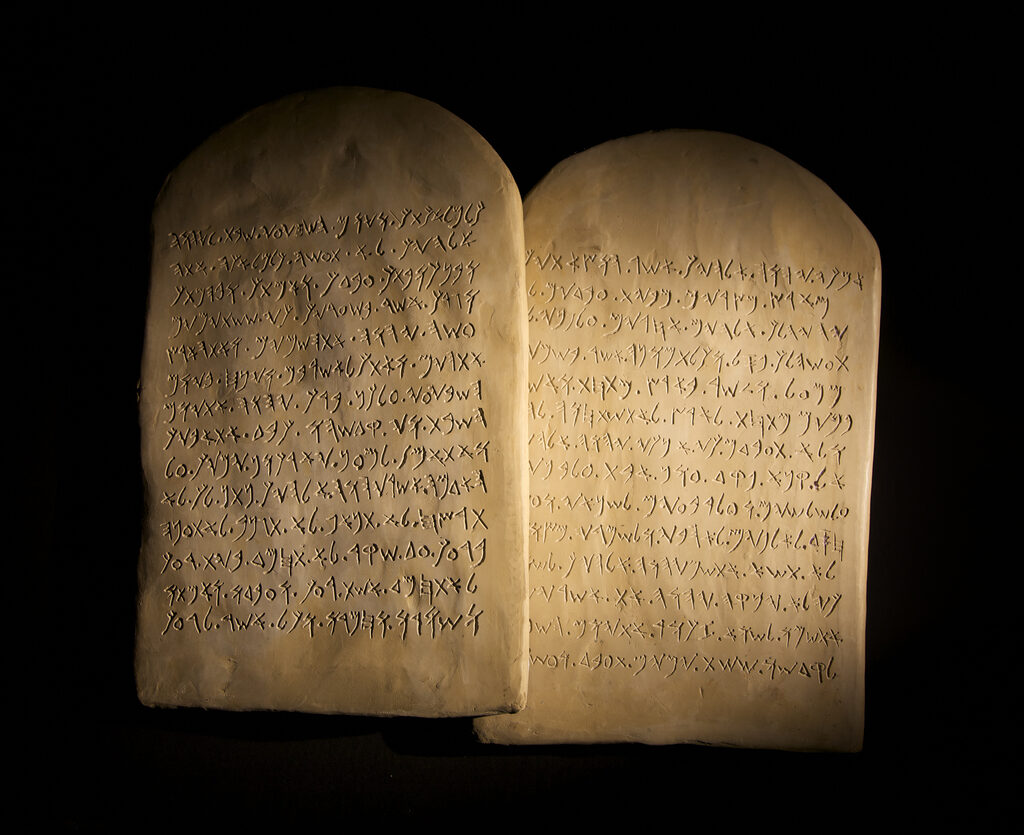3 March, 2024: Exodus 20:1-17
I have been watching the acclaimed series The Walking Dead, a show about a worldwide zombie apocalypse. But the zombies aren’t the point. It is about the way in which the human survivors navigate a new world. Will they lose their humanity or will they be able to create something new?
I have been intrigued with the way in which a number of different settlements have come into being. One of the characters tries to establish a set of rules that all the settlements can live by, a new Charter, as it were. Despite her attempts, it never happens.
The Ten Commandments, in contrast, have shaped the Western world in profound ways, along with Jesus’ reinforcement of loving God and loving others as oneself. They were radical for their time and laid out a way for the nation of Israel to behave towards God and others.
Why do they stand the test of time and continue to influence human interaction? Possibly because they are not human laws, but given by a loving, creator God for the benefit, protection, and flourishing of humanity.
They are a good foundation for a caring, loving, flourishing and God-honouring society. Yet, we still need Jesus!
10 March: Psalm 107:1-3, 17-22, Ephesians 2:1-10, John 3:14-21
This Sunday’s lectionary readings are very well chosen. The connections between them are profound as we trace an early church understanding of Jesus’ sacrifice, and how Christians are meant to respond to his death and resurrection.
The Psalmist is remembering the many ways that God has delivered God’s people from geographical hardships, being slaves in a foreign land, and being sick because of their sinful ways. In the reading God is praised for delivering them from destruction, and healing them, despite the fact that it was their own iniquities that got them in trouble.
In John, Jesus is compared specifically to the very serpent that Moses made in the desert. Just like the snake had to be raised and looked upon for the Israelites to be healed from venomous bites, Jesus has to be lifted up so that “whoever believes in him should not perish but have eternal life”. That was God’s plan. That is why Jesus was sent into creation.
Finally, in Ephesians, we read what we are to do with this salvation life that we live in. We are no longer dead in our transgressions, but alive in Christ. As such we have good works to do which God prepared for us to walk in.
17 March: Psalm 51:1-12
David has been caught out. Nathan, the prophet, has come to him, after David has committed adultery with Bathsheba and murdered her husband Uriah. Nathan has revealed that God knows what has happened. Psalm 51 is David’s response.
It is a heartfelt cry for forgiveness, for God to blot out David’s transgressions and cleanse him from sinfulness. David wants to know God’s joy and love once again and he will respond with praise and the willingness to teach others of God’s grace and mercy.
I’ve always had a couple of reservations about this Psalm. Firstly, would it have ever been composed if Nathan had not called out David’s sin? Consequently, do we need to have “Nathans” in our own lives who call out our weaknesses, blind spots and sin?
24 March: Mark 11:1-11
Palm Sunday celebrates an event known as the Triumphal Entry. Jesus rides into Jerusalem on a young donkey, surrounded by his disciples, followers, and residents of Jerusalem. Many are holding palm or leafy branches they have collected, scattering both these, and clothing, on the ground for the donkey to walk over. They are cheering for Jesus.
The people are welcoming in a King. Jesus, along with many present, would know a passage from Zechariah 9:9.
Zechariah’s prophecy is about a King who will lead in peace across the known lands. He won’t be like the kings of the past who were sinful shepherds, who failed to care for and protect God’s people.
By riding into Jerusalem, on an unridden donkey, Jesus is understood to be fulfilling this prophecy. He will be the Good Shepherd. This type of transition would be signalled with the new King riding the old King’s horse. An unridden donkey signals a humble ruler whose leadership is totally new and did not come from a man, but from God.
It would not be long, however, before the cries in Jerusalem would change from “Hosanna” to “Crucify him!”
31 March: Easter Day
Mark 16:1-8, Isaiah 25:6-9
The women are scared. James’ mother Mary, Mary Magdelene, and Salome have brought spices to the tomb to anoint Jesus’ body. Their concerns about the stone blocking their way, and them not being able to fulfil their ritual duties, turn out to be unfounded. The stone has been rolled away and they can walk right in to the tomb.
But Jesus is not there.
Instead, they find a young man, dressed in white. Shockingly, he tells the three women that Jesus has risen. He is no longer dead, but will be going ahead of the disciples to Galilee.
The passage in Isaiah gives a tiny glimpse of what Jesus’ death and resurrection would mean, not just for the disciples, or Israel, but for all people, and all creation.
Mary, Mary, and Salome may not have understood what was happening. We might not have witnessed the fulfilment in its fullness yet, but in Christ’s death and resurrection, all things have been made new and we enjoy a new relationship with the loving Creator of the cosmos.
Dr Katherine Grocott














1 thought on “March: We Still Need Jesus ”
Thanks for the insights